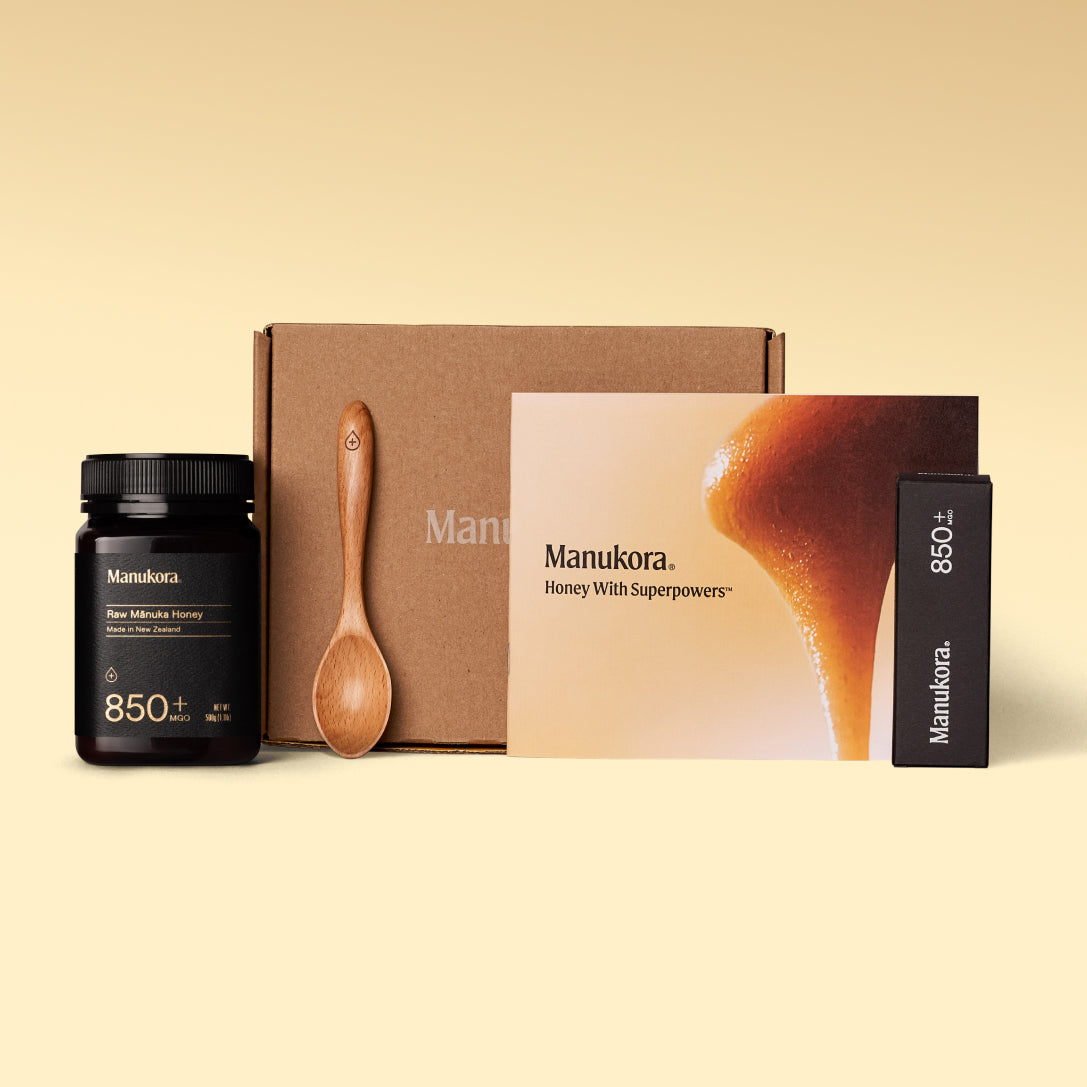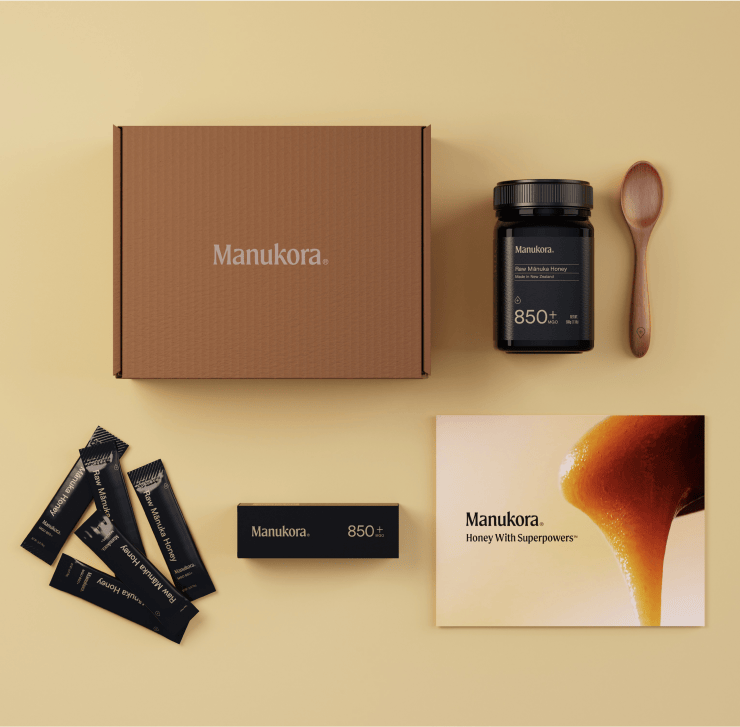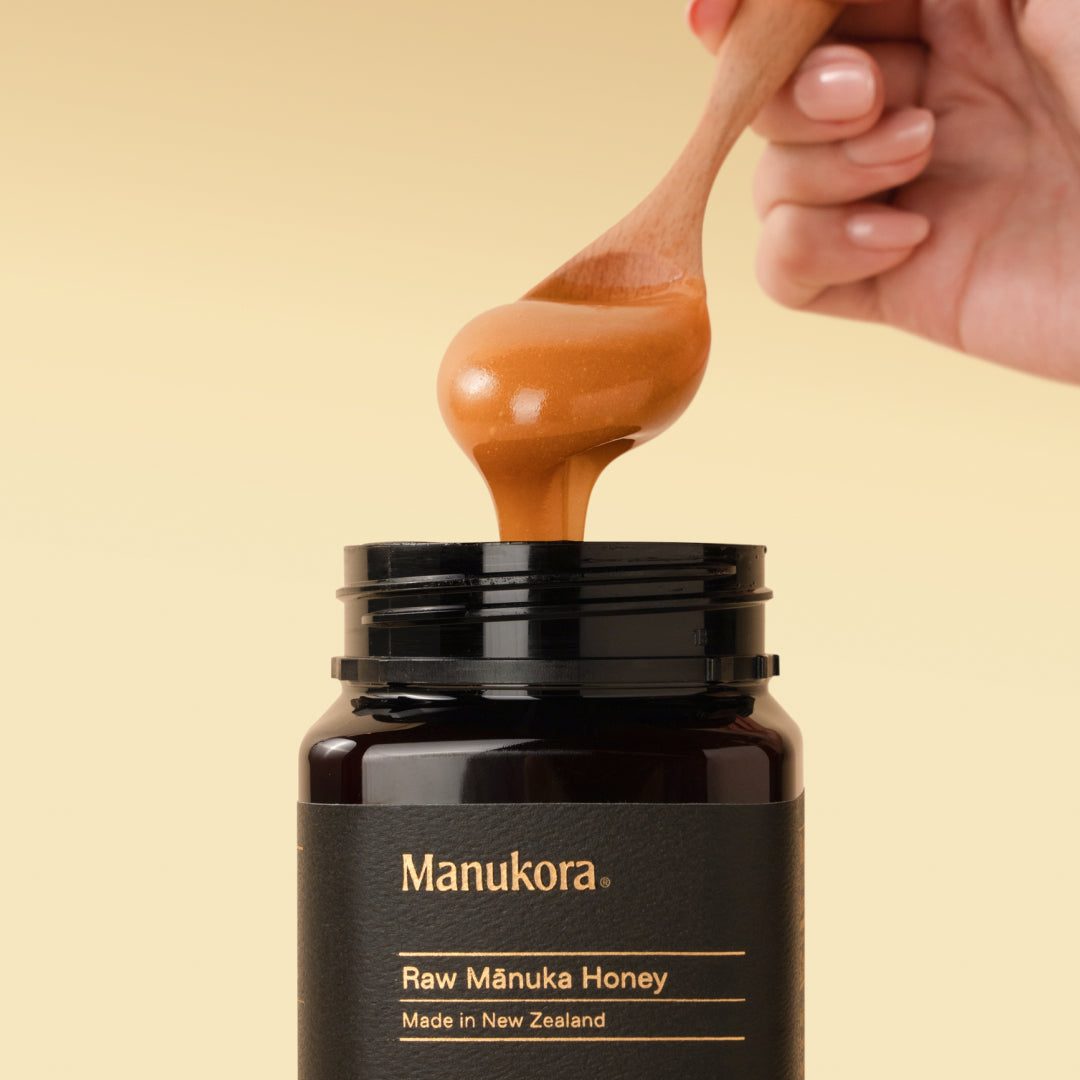Executive Summary:
- Filtered honey is honey that has had the honeycomb, wax, and other pieces removed.
- Ultrafiltration involves adding water to thin the honey out, filtering it through intense pressure, and removing the water to thicken the honey again.
- Manukora honey is delicately strained to remove impurities but still retains its raw beneficial nutrients, including MGO, Leptosperin, and prebiotics.
Discovering the Difference Between Filtered vs. Unfiltered Honey
From honey in tea to honey-and-peanut-butter sandwiches, this golden nectar is a staple in many individuals' lifestyles. In fact, many people see honey as a healthier alternative to sugar or artificial sweeteners, and yes, there's some serious truth to this! Some types of honey, like Manuka honey, are home to beneficial nutrients that support immunity, digestion, and overall wellness.
Maybe you've heard a bit of buzzing about unfiltered and filtered honey. So, what's the difference? The two have many distinctions, but the main difference lies in the nutrients within the final honey product.
Let's explore what this means in more detail. Is one type of honey better than the other?
Manukora honey is delicately strained to ensure it retains the powerful natural nutrients, such as MGO and prebiotics, crucial for supporting immune and digestive health.
Understanding Unfiltered Honey: What Is Raw Unfiltered Honey?
Unfiltered honey is honey that still includes wax, pollen, and other particles that naturally get into the honey during the honey-making process.
Unfiltered honey is generally unpasteurized or raw. However, it can also be strained and still be considered unfiltered. This is because straining removes large particles from the honey, such as bee parts, but is not as involved as the actual filtering process.
Filtered Honey Explained: Is Filtered Honey Any Good?
Filtered honey is essentially honey that has had the honeycomb, wax, and other bits and pieces removed. This process, along with high-heat processing, gives filtered honey its consistent and semi-crystal-clear look.
Honey sold in the grocery store (and even at some farmer's markets) is usually filtered and often highly processed. While filtered honey may look clean, crisp, and uniform, many of honey’s nutrients are diminished during processing. In other words, this may not be a worthy trade-off if you look to honey as more than just a sweetener.
The best thing you can do is pay attention to the labels on your honey before you buy. Even if honey is labeled organic, that doesn’t mean it's raw or unfiltered. If the honey in your pantry has been filtered and pasteurized, it may not be as beneficial as advertised.
Filtered honey may look clean and uniform, but it's the unfiltered honey that maintains the wholesome goodness of nature's own sweetener.
The Process Behind Filtering Honey: How Is Honey Filtered?
Honey can be filtered in a few different ways, but many commercial honey makers use a process called ultrafiltration. This process involves adding water to the honey to thin it out, filtering the thin honey through intense pressure, and then removing the water to thicken the honey again.
Processing Method
|
Processing Method |
Description |
|
Ultrafiltration |
Involves diluting honey with water, filtering under high pressure, and reconcentrating by removing water. |
|
Straining |
Involves passing honey through a mesh to remove large particles but retains most natural properties. |
|
Pasteurization |
Involves heating honey at high temperatures to kill yeast cells and improve shelf life but may reduce nutrients. |
Filtered honey can also undergo an intense heating and cooling process called pasteurization. These rapid temperature changes are meant to dehydrate the honey and extend its shelf life. If there’s any water left in the honey, it’ll spoil much sooner after being packaged.
Honeybees naturally dehydrate honey themselves, but it takes time—time most commercial beekeepers don’t want to fit into their production plans.
At Manukora, we do things a little differently. We implement ethical beekeeping practices that allow the bees the freedom to work at their own pace, effectively dehydrating the honey and capping each honeycomb when the process is complete.
For the sake of the bees' health and the quality of our Manuka honey, we’ve spent years mastering our extraction process. We know this natural process can be time-consuming, but we want to keep the integrity of our honey intact. This is why we don’t interrupt our bees and wait until the honey is 100% ready before we harvest.
When it comes to filtering, we delicately strain our Manuka honey to keep it smooth and creamy. And that’s it—no additional heating or processing.
Honey is sensitive to heat, which is why pasteurizing honey can be detrimental to the concentration of its natural nutrients. Pasteurized processed honey is rapidly heated to 170 degrees and then cooled to 130 degrees.
The harsh increase and decrease in temperature can cause reactions in the honey that may reduce many of its beneficial nutrients.
Keeping honey raw helps to maintain its rich, natural wellness properties. This is especially important for Mānuka honey, which is home to exceptionally powerful nutrients.
Our Mānuka honey contains nutrients like Methylglyoxal (MGO), Leptosperin, and prebiotics. MGO, in particular, is an organic compound that comes from Mānuka nectar and is a key factor contributing to Mānuka honey’s worldwide recognition.
Manukora Tip: Don't be alarmed if your Manuka honey appears hard or crystallized. Raw, unfiltered honey commonly undergoes a natural process called crystallization. We know it may look a little odd, but don’t worry—it’s not spoiled. Simply warm it gently if you want it soft and gooey again, and store it in a cool, dry place. You can check out our guide on how to soften hardened honey here.
Regular Unfiltered Honey vs. Manuka Honey
Regular unfiltered honey still offers beneficial nutrients, but not the same ones as Mānuka. Manuka honey is unique to a remote region in New Zealand and can only be produced by the European bees that forage in the region's subtropical forests.
The distinctive quality found in our honey comes from the precious Manuka nectar collected by our worker bees. Manuka nectar comes from the blossoms of the New Zealand Manuka tea tree and is home to the powerful nutrients that make Manuka honey particularly special.
Some of these nutrients, like MGO, contribute to its unique properties, while others support general wellness, immunity, and digestive health.
Key Nutrients in Manuka Honey
|
Nutrient |
Function |
|
MGO (Methylglyoxal) |
Contributes to the unique properties of Manuka honey. |
|
Leptosperin |
Specific to Manuka honey, indicating the purity and authenticity of the honey. |
|
Prebiotics |
Supports digestive health by promoting the growth of beneficial bacteria in the gut. |
While we may be biased, we believe Manuka honey is the cream of the crop and the most powerful honey on the planet—that’s why we call it Honey With Superpowers™. Our Manuka honey only goes through coarse straining and still retains every bit of its beneficial nutrients.
Here are just a few benefits you can expect from Manuka honey (depending on its MGO level).
Wellness Support
MGO is a special compound unique to Mānuka honey, making it a key supporter of overall wellness. When taken by the spoonful or drizzled on your peanut butter toast, Mānuka honey can also help fuel you with energy thanks to its natural carbohydrate content.
We recommend our MGO 600+ Manuka honey for daily wellness support.
Immune Support
Thanks to its bioactive compounds and nutrients, Manuka honey can support your immune system. Mānuka also contains polyphenols and flavonoids, both of which offer antioxidant properties and contribute to Mānuka’s role as a super honey.
We recommend our MGO 850+ Manuka honey to support your natural, healthy immune response.
Digestive Support
It’s no secret your digestive health is vital to the proficiency at which your entire body performs.
Manuka honey contains high levels of prebiotics and other nutrients, which can help you maintain a healthy and balanced digestive system by supporting the beneficial bacteria in your gut.
We recommend our MGO 1000+ Manuka honey for daily digestive support to help maintain optimal gut health.
How Should I Enjoy Mānuka Honey?
To build your routine, start each day with one heaping (14g) teaspoon dose of Manuka honey. For maximum benefits, savor it straight, or stir it into your morning tea, coffee, or lemon water. Consistency is key—daily intake helps support overall wellness.
If you wish to boost your benefits, you can add 1-2 more heaped teaspoons throughout your day as needed.
While we recommend enjoying Manuka honey straight for optimal benefits, you can also get creative and integrate it into your favorite foods and beverages:
- Supercharge Your Beverage: Add a heaping teaspoon of Manuka honey to sweeten your morning drink.
- Try It on Toast: Spread it on toast for a quick and delicious start to your day.
- Sweeten Your Greek Yogurt: Drizzle it over plain Greek yogurt for a naturally sweet treat.
- Enhance Desserts: Use it as a topping for ice cream or other desserts for added flavor and enjoyment.
Summary
Filtered honey goes through a filtering process that removes honeycomb, pollen, and other bits in the honey to reveal a clear and clean product. Meanwhile, unfiltered honey still retains most of those extra parts. While unfiltered honey is almost always raw, filtered honey can be either raw or processed.
Unpasteurized honey retains much more of its beneficial nutrients and typically has more to offer to support your overall wellness compared to processed honey. Combine these properties with the unique benefits of raw Mānuka honey, and you have a sweet treat that can also support your wellness, immune system, and gut health!
Our Manukora Dose Spoon can help you enjoy the perfect amount of this nutritious sweetener. For those seeking an even more potent option, our MGO 1000+ Manuka honey provides an extraordinary level of bioactive nutrients.
To support various health needs, our Immune Support collection includes a range of Manuka honey products tailored for wellness enhancement. Dive deeper into the Manuka honey world with our blog posts and discover the unique Manuka Honey Taste and how the New Zealand landscape influences Mānuka honey.
FAQs About Filtered vs. Unfiltered Honey
What's the difference between filtered and unfiltered honey?
The main difference is the level of processing. Filtered honey goes through a rigorous process that removes elements like honeycomb, wax, and pollen. In contrast, unfiltered honey retains these natural elements, offering a richer taste and wellness benefits.
What is raw unfiltered honey?
Raw unfiltered honey is honey in its most natural state. It's unpasteurized and unprocessed, retaining the natural wax, pollen, and other particles from the honey-making process.
Is unfiltered honey better?
Unfiltered honey retains more of the beneficial compounds found in honey, which can offer wellness benefits. However, the choice between filtered and unfiltered often comes down to personal preference.
Is there a visual difference between filtered and unfiltered honey?
Yes, filtered honey is usually somewhat clear and very uniform in appearance. Meanwhile, unfiltered honey is cloudier due to the particles it retains.
Sources:
Frozen yogurt, vanilla, soft serve nutrition facts and analysis. | nutritionalvalue.org
10 Signs of an Unhealthy Gut | Frederickhealth.org
Honey and Health: A Review of Recent Clinical Research | PMC


















